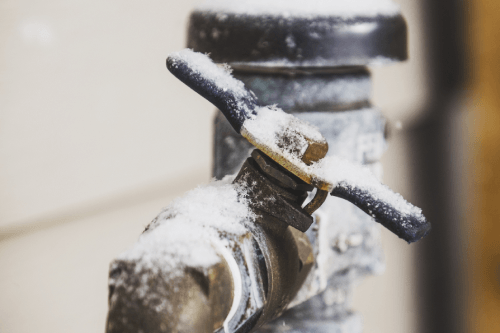Preventing Pipes from Freezing: Best Methods
Preventing Pipes from Freezing: Best Methods
Blog Article
The publisher is making a few great observations relating to Helpful Tips to Prevent Frozen Pipes this Winter in general in the content down the page.

Winter can ruin your plumbing, especially by freezing pipes. Below's just how to prevent it from happening and what to do if it does.
Intro
As temperatures decline, the risk of frozen pipelines boosts, possibly resulting in costly fixings and water damage. Comprehending exactly how to stop frozen pipelines is crucial for property owners in cool climates.
Prevention Tips
Insulating at risk pipes
Wrap pipelines in insulation sleeves or use heat tape to secure them from freezing temperature levels. Focus on pipes in unheated or outside locations of the home.
Home heating techniques
Maintain interior areas properly heated, specifically areas with pipes. Open closet doors to permit cozy air to distribute around pipes under sinks.
Exactly how to identify icy pipes
Try to find decreased water circulation from faucets, uncommon smells or noises from pipes, and noticeable frost on subjected pipelines.
Long-Term Solutions
Architectural modifications
Take into consideration rerouting pipes away from exterior wall surfaces or unheated areas. Include additional insulation to attics, basements, and crawl spaces.
Upgrading insulation
Buy high-grade insulation for pipelines, attics, and wall surfaces. Correct insulation assists maintain constant temperatures and lowers the risk of frozen pipes.
Protecting Outdoor Pipes
Yard pipes and outside faucets
Disconnect and drain garden hoses before wintertime. Set up frost-proof spigots or cover outdoor taps with shielded caps.
Recognizing Icy Pipes
What triggers pipelines to freeze?
Pipes freeze when exposed to temperature levels listed below 32 ° F (0 ° C) for prolonged periods. As water inside the pipes ices up, it expands, taxing the pipe wall surfaces and potentially creating them to break.
Threats and damages
Icy pipes can cause water interruptions, residential or commercial property damages, and pricey fixings. Ruptured pipes can flooding homes and trigger considerable structural damages.
Signs of Frozen Piping
Recognizing frozen pipes early can avoid them from breaking.
What to Do If Your Pipelines Freeze
Immediate activities to take
If you believe icy pipelines, keep taps open up to relieve stress as the ice thaws. Use a hairdryer or towels taken in hot water to thaw pipelines slowly.
Final thought
Protecting against icy pipes requires aggressive procedures and fast actions. By comprehending the reasons, signs, and safety nets, home owners can safeguard their plumbing during winter.
Helpful Tips to Prevent Frozen Pipes this Winter
UNDERSTANDING THE BASICS: WHY PIPES FREEZE AND WHY IT’S A PROBLEM
Water freezing inside pipes is common during the winter months, but understanding why pipes freeze, and the potential problems it can cause is crucial in preventing such incidents. This section will delve into the basics of why pipes freeze and the associated problems that may arise.
THE SCIENCE BEHIND FROZEN PIPES
When water reaches freezing temperatures, it undergoes a physical transformation and solidifies into ice. This expansion of water as it freezes is the primary reason pipes can burst. As the water inside the pipe freezes, it expands, creating immense pressure on the walls. If the pressure becomes too great, the pipe can crack or rupture, leading to leaks and water damage.
FACTORS THAT CONTRIBUTE TO PIPE FREEZING
Low Temperatures: Extremely cold weather, especially below freezing, increases the risk of pipes freezing. Uninsulated or Poorly Insulated Pipes: Pipes located in unheated areas, such as basements, crawl spaces, or attics, are more prone to freezing. Insufficient insulation or lack of insulation altogether exacerbates the problem. Exterior Wall Exposure: Pipes running along exterior walls are susceptible to freezing as they encounter colder temperatures outside. Lack of Heating or Temperature Regulation: Inadequate heating or inconsistent temperature control in your home can contribute to frozen pipes. PROBLEMS CAUSED BY FROZEN PIPES
- Pipe Bursting: As mentioned earlier, the expansion of water as it freezes can cause pipes to burst, resulting in significant water damage.
- Water Damage: When pipes burst, it can lead to flooding and water damage to your property, including walls, ceilings, flooring, and personal belongings.
- Structural Damage: Prolonged exposure to water from burst pipes can compromise the structural integrity of your home, leading to costly repairs.
- Mold and Mildew Growth: Excess moisture from water damage can create a favorable environment for mold and mildew growth, posing health risks to occupants.
- Disrupted Water Supply: Frozen pipes can also result in a complete or partial loss of water supply until the issue is resolved.
WHY CERTAIN PIPES ARE MORE PRONE TO FREEZING
- Location: Pipes located in unheated or poorly insulated areas, such as basements, crawl spaces, attics, or exterior walls, are at higher risk of freezing.
- Exterior Pipes: Outdoor pipes, such as those used for irrigation or exposed plumbing, are particularly vulnerable to freezing as they are directly exposed to the elements.
- Supply Lines: Pipes that carry water from the main water supply into your home, including the main water line, are critical to protect as freezing in these lines can affect your entire plumbing system.
- Underground Pipes: Pipes buried underground, such as those connected to sprinkler systems or outdoor faucets, can be susceptible to freezing if not properly insulated.
https://busybusy.com/blog/helpful-tips-to-prevent-frozen-pipes-this-winter/

As an enthusiastic reader about Helpful Tips to Prevent Frozen Pipes this Winter, I assumed sharing that chunk was worth the trouble. If you please take the time to distribute this article if you liked it. Kudos for being here. Revisit us soon.
Book Your Appointment Report this page